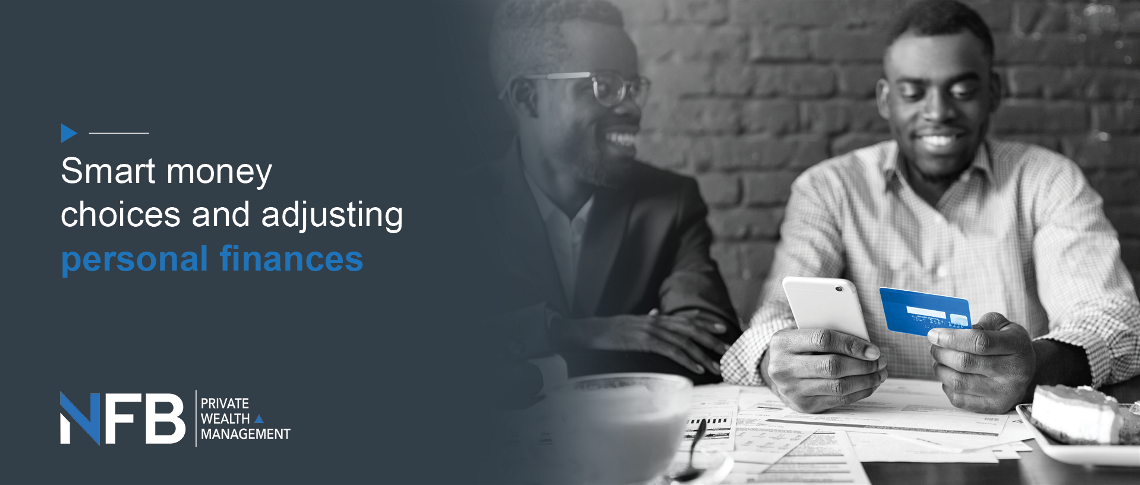How to Make Smart Money Choices
As COVID-19 is teaching us, you can’t predict what’ll happen in the future but it’s good to be prepared. Our tips on smart money management can help you prepare for your financial future.


Are you stuck working from home, ploughing your way through your pantry and wondering how to fill the gaps this lockdown has created in your usually-packed social calendar? With a bit of extra time on your hands, now might be a good time to get on top of your finances. It’ll certainly help take your mind off the chaos caused by the virus. We’ve put together 5 tips to help get you started.
1. Draw up a monthly budget.
It’s easy enough to draw up of a monthly budget but sticking to it is a completely different ballgame! Remember that a budget is made up of your income and expenses. But you shouldn’t underestimate your expenses in order to make your budget look good. It really should be as realistic as possible otherwise you’ll never be able to abide by it and it won’t give you an accurate picture of your financial position.
If your income less your expenses gives you a positive number: well done, you’re living within your means and you can save this extra cash for a rainy day. If your income less your expenses gives you a negative number: you’re spending more than you earn. This may well happen from time to time (i.e. when the petrol price goes up or interest rates change), so your budget should be flexible enough to make provisions for such cases. However, it’s a dangerous position to be in on a regular basis; it may mean you need to take on debt to finance your lifestyle (which we don’t recommend).
2. Pay your debts in time
Just like there’s food that’s good for the body and food that’s bad for the body, there are two types of debts: healthy and unhealthy debts. Unhealthy debts are the debts you take out to support your living costs and loans that attract high interest (typically because they are not secured). We recommend you stay away from these unhealthy types of debt if you can because you might find yourself in a debt trap (a situation in which repaying them becomes impossible). Healthy debts are debts like your home loan and car repayments. You should be able to finance them using your income. If you have to borrow to repay your debt, you need to make some urgent changes.
Importantly, all your debts should be paid in time on a monthly basis. Doing this will give you financial freedom and means you avoid having to pay unnecessary interest. It’s also how you get yourself a good credit score which will help you get credit in the future.
3. Spend what you have
It’s easy to get drawn into living to please your peers. It’s not much fun being the one who always says “No, I don’t have money to go out” or “No, I can’t afford those expensive shoes”. It takes discipline to only spend the money you’ve allocated to yourself for spending in your budget. But living beyond your means, as we’ve discussed, can land you in the uncomfortable position of taking on unnecessary debt.
4. Allocate a portion of your income to savings
Once you have paid off your debts, allocate yourself your spending money for the month, you will hopefully have some money leftover that you can allocate to savings. If this isn’t the case, you need to look for ways in which to cut costs and reduce spending. It’s helpful for some people to have a savings goal: maybe that’s buying a car or it’s just for a rainy day. Whatever your aim, it can be useful to have something to work towards so that you’re motivated to save wherever possible.
5. Don’t forget to reward yourself
The good news is that it’s not all about scrimping and saving. At the end of the day, you work hard for your money and there’s no reason why you shouldn’t reward yourself every now and then. We recommend you plan your rewards in advance so that they can be taken into account in your monthly budget.
Being smart with your money
These tips might be hard to implement at first; old habits die hard so it may be quite a change for you if you’re a big spender or a big borrower. But you’re the only one who can change your habits and it’s never too early (and it’s seldom too late), to start making smart money choices.
Starting out in your wealth journey? NFB prides itself on the fact that we are Independent Wealth Managers, partner with us for sound financial practices and advice.













